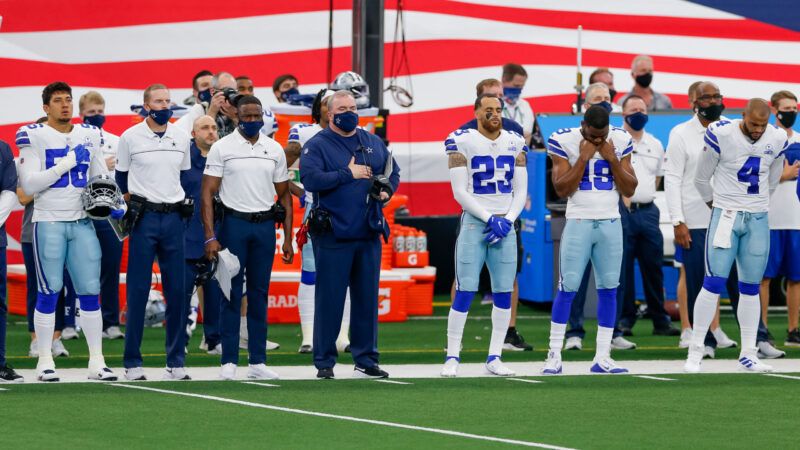States Move To Force Sports Teams To Play the National Anthem
Three states have advanced constitutionally questionable laws.

For the first time, some states are moving to turn the decades-old cultural norm of playing the national anthem before a sporting event into a legal requirement.
On Wednesday, Texas' Republican Gov. Greg Abbott signed into law Senate Bill (S.B.) 4, which will require professional sports teams to play the national anthem at the start of each preseason, regular season, and postseason game hosted in Texas. Enforcement is not criminal, which supporters say gives the law more leeway under the First Amendment. Instead, the law requires all financial agreements between pro sports teams and state and local governments to include written verification that the team will play the anthem. If a team fails to comply, it would default on the financial agreement and suffer whatever consequences the agreement spells out.
For example, the Dallas Mavericks have a lease to play in the American Airlines Center, which is owned by the city of Dallas. If the Mavericks stopped playing the anthem, they would be in default and the lease would be terminated (this would almost certainly spark legal action by the Mavericks challenging the default or the law). But the law only applies to future agreements, not existing ones, and the Mavericks have a lease through 2031. The kinds of financial agreements covered by the legislation may not just be stadium subsidies or leases, but could also involve tourism sponsorships or security arrangements with local law enforcement.
The Mavericks are the most relevant example here because they inspired the legislation. In February, it was reported that the team skipped playing the anthem before 13 preseason and regular season home games. No one really noticed because fans weren't in the arena until the last of those games. On February 10, the NBA announced it would again enforce its long-standing rule requiring the anthem, and Texas Lt. Gov. Dan Patrick, also a Republican, vowed to make legislation requiring the anthem one of his top priorities.
Only two of Texas' 31 senators voted against the bill in April (with one absence), and on May 25 it passed the Texas House with a supermajority in favor.
A similar bill was signed into law in Louisiana on Monday that would require the playing of the national anthem before all sporting events at venues that were subsidized by state or local governments. That law, though, includes no criminal or financial penalties. Detractors of the legislation have wondered if the requirement would apply all the way down to Little League games or even pick-up basketball games played at public parks. The Wisconsin Assembly passed legislation nearly identical to the Louisiana law, but it has since sat dormant in the Wisconsin Senate for more than a month.
None of the bills say players or attendees have to stand for the anthem or even be in the area of play when the anthem is played, but the debate has clearly been inspired by Colin Kaepernick's kneeling and the subsequent protests of the last five years.
Supporters of the Texas law believe it will stand up to First Amendment scrutiny because it doesn't mandate the playing of the anthem and instead only requires it for teams that receive public dollars. State Rep. Dustin Burrows (R–Lubbock) said, "If they do not want to play the national anthem, they don't take the tax dollars." But the Supreme Court has, time and time again, set precedents that the government can't compel speech, even as a condition of doing business with the government.
"You can't make financial incentives or doing business conditioned on expressing a particular point of view," Amy Kristin Sanders, an attorney and a professor at the University of Texas at Austin's journalism school, tells Reason. "There's a line of Supreme Court cases that specifically address these kinds of issues.…Essentially what they say is it doesn't matter what the context is, the government can't tell people what they must say."
Case after case after case, some with traditionally liberal justices in the majority and others with conservatives in the majority, repeat this crucial precedent: "The government may not deny a benefit to a person on a basis that infringes his constitutionally protected…freedom of speech even if he has no entitlement to that benefit."
Sanders says the Louisiana and Wisconsin legislation were "not at all" more constitutional than the Texas law just because they don't have a criminal penalty.
It seems unlikely that any team will actually try to forgo the national anthem anytime soon (especially if even the NBA is still requiring it) and it could be years until a team makes a new financial agreement with the state or a local government that would include the required language under the Texas law.
But that doesn't mean the law won't have any effect. "The real problem with these kinds of laws once they get passed is then someone has to have the resources to challenge them in court," Sanders says. "Until someone challenges them in court and gets overturned, there's a chilling effect."


Show Comments (90)